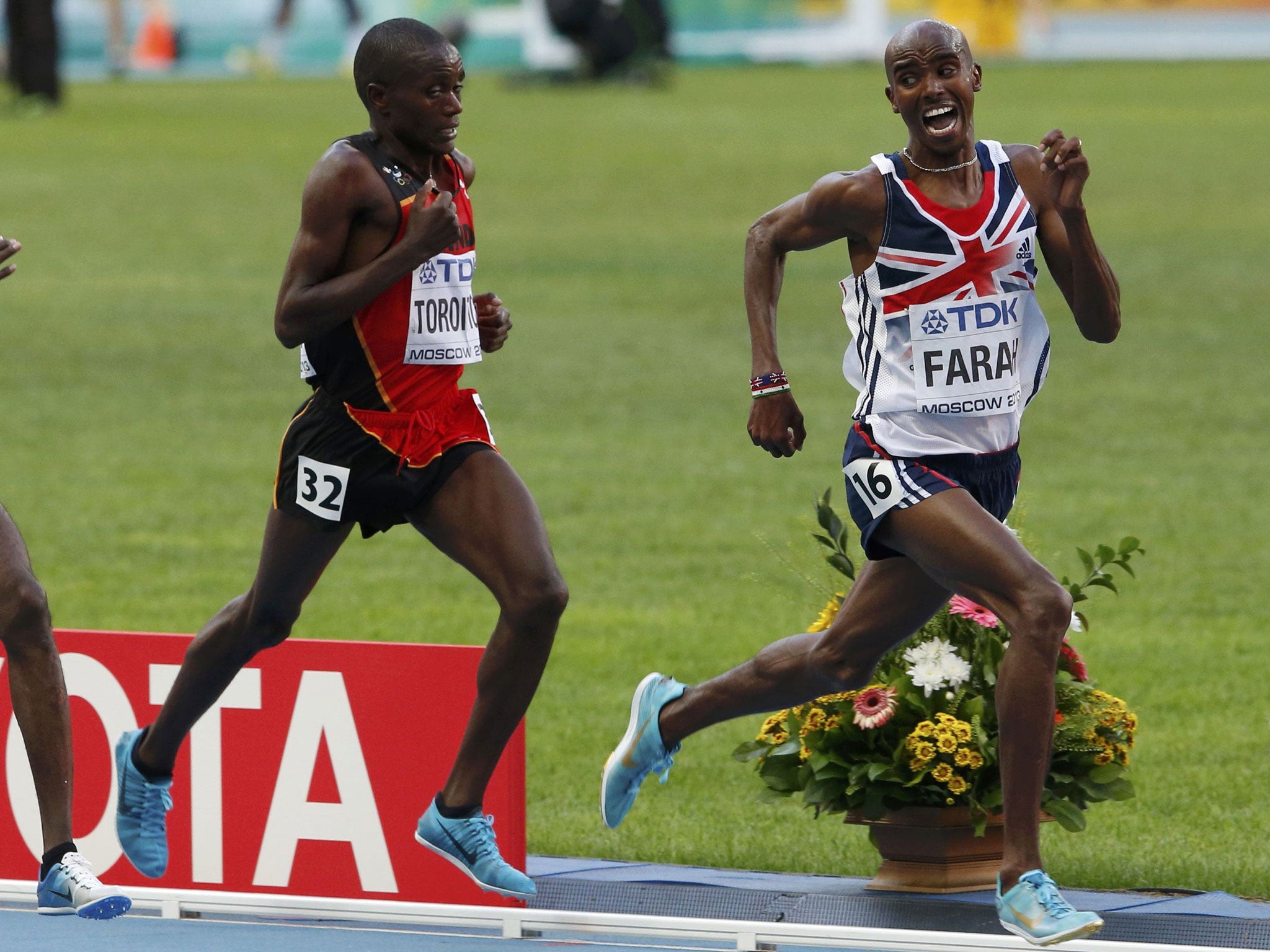World Championships: Mo Farah's devastating final burst makes all the difference
Remarkable pace developed in training with Alberto Salazar seals superiority

Your support helps us to tell the story
From reproductive rights to climate change to Big Tech, The Independent is on the ground when the story is developing. Whether it's investigating the financials of Elon Musk's pro-Trump PAC or producing our latest documentary, 'The A Word', which shines a light on the American women fighting for reproductive rights, we know how important it is to parse out the facts from the messaging.
At such a critical moment in US history, we need reporters on the ground. Your donation allows us to keep sending journalists to speak to both sides of the story.
The Independent is trusted by Americans across the entire political spectrum. And unlike many other quality news outlets, we choose not to lock Americans out of our reporting and analysis with paywalls. We believe quality journalism should be available to everyone, paid for by those who can afford it.
Your support makes all the difference.Sitting in a room in the main stand before the evening session began in the Luzhniki Stadium yesterday, Sebastian Coe pondered the possibility of a spanner being thrown into the works of the men's 10,000m final. "It's difficult to know what will be going through the minds of anybody in that warm-up area before the race," he said. "With a 3min 28sec in his range of skill-sets now as a 1500m runner, it's difficult to know how they are going to tackle him."
By him, the good British Lord meant Mo Farah. By they, he meant the other 31 souls who were preparing to go into the 25‑lap race, apparently devoid of a prayer.
"He's not going to be worrying about a fast pace," Coe continued, "and if it's a classic sit-and-kick type race then that kind of leg speed is not going to be challenged either."
For all that Farah has achieved over the past three summers under the direction of the American distance running guru Alberto Salazar, perhaps the most staggering of all is that he has become a faster 1500m runner than Coe ever was – or Steve Ovett or Steve Cram, for that matter. For a runner whose chief competitive business happens to be the 5,000m and 10,000m, that is one mighty piece of weaponry.
It is also a measure of the status the Somali-born Londoner has acquired. Coe, Ovett and Cram have long been revered as all-time greats not just of British track and field but also of world athletics. Between them, they won four global titles – Coe the Olympic 1500m here in 1980 and in Los Angeles in 1984, Ovett the Olympic 800m here in 1980 and Cram the 1500m at the inaugural World Championships in Helsinki in 1984.
Farah now has four to his name alone, having duly put his 31 nominal rivals to the sword in the same arena where Coe and Ovett fought their epic Olympic battles a third of a century ago – deliciously so in the end, doing what he was unable to do at the last World Championships in Daegu two years ago, running away from the Ethiopian Ibrahim Jeilan down the final 100m of the home straight, appearing to mouth "Yes, yes, yes" as the finish line approached.
Frighteningly, almost, after going through history without a male global distance running champion, Britain now has one who makes the art of world-beating look routine. We also have an athlete who can claim to be our greatest ever – in one respect, at least. No British athlete in any event has ever won more than three global outdoor – World Championship or Olympic – gold medals, Farah having been tied with the triple jumper Jonathan Edwards and the decathele Daley Thompson on three, after his 5,000m win in Daegu and his 5,000m-10,000m double at London 2012.
The purists and pedants would point out that Edwards and Thompson – plus Ovett, Coe and Cram – all made their mark in the world record books, something Farah has not yet. They would also make the point that the Olympics should perhaps be the ultimate arbiter in terms of competitive worth. The World Championships only came into being in 1983, and initially as a quadrennial rather than the present biennial entity. Coe never ran in a World Championships. Like Farah, and Thompson, he has two Olympic golds.
Come Friday night and the 5,000m final, the chances are that Farah's global gold collection will go up to five. Not that the 29‑year‑old stick insect is remotely bothered about shouting the odds of all-time greatness. "I don't perceive myself to be great or anything else," Farah said. "I'm just enjoying myself and aiming to collect as many medals as I can for my country. What people want to think, that's for them."
Farah could afford to treat the opening laps as what he described as "a warm-up," loitering out of trouble at the back of the field. The biggest danger to him was always liable to be the threat of a fall. He did stumble after getting clipped from behind with three and a half laps left but regained his balance.
By then, the race was in the bag, his rivals having allowed the contest to drift into a sit and kick job. He sat, he kicked, and he conquered. It was a familiar story: Farah, from the madding crowd.
Join our commenting forum
Join thought-provoking conversations, follow other Independent readers and see their replies
Comments